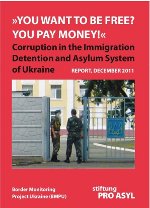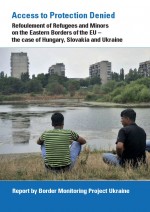UNHCR Ukraine recently stated (source):
UNHCR is pleased that the draft legislation currently under consideration would bring Ukrainian practices related to migrant detention into line with international and European standards, and encourages lawmakers to positively consider the proposed improvements. In practice, a significant proportion of persons detained for migration-related offenses choose to seek asylum, and therefore are persons of concern to UNHCR. When foreigners are detained for the purposes of deportation, this detention does not service the usual purposes of detention, neither punishment nor deterrence. Punishments for administrative violations, like attempting to cross the border without valid documentation, are available in law, and are usually short (e.g., 15 days administrative detention). When individuals are detained for purposes of deportation, with lengthy periods of detention up to 12 months, the only purpose of that detention is to gather the information and documentation necessary to implement the deportation. Legislation relating to this detention needs to contain procedural safeguards to ensure that this detention serves its purpose, and that the deportation order is actually lawful and enforceable.
Current legislation allows for administrative bodies, such as the State Border Guard Service, to authorize the detention of foreigners, apprehended within controlled border districts during an attempt or after illegal state border crossing at the MCCs, without the guarantee of a speedy judicial review of that decision.
At present, many foreigners are detained for a full twelve months at public expense without any efforts being made to actually implement their deportation. Besides being a questionable use of scarce resources, this situation also violates the provisions of the European Convention on Human Rights, which stipulates that if deportation of an individual is not being implemented by the authorities with due diligence, the detention of that individual becomes unlawful.
Once again, it must be noted that it was the European Union which pushed Ukraine to build up new detention cites and supported (and still supports) the construction and running with (financial) resources, as documented in detail on this website. That after decades of influence of the European Union in the Ukrainian migration regime – with the result of thousands of unlawfully detained (potential) asylum-seekers – only now maybe (!) a law according to the standards of the European Convention on Human Rights will be implemented must be heavily criticized. Should the European Union – the so-called “space of freedom, security and justice” not take care about that before pushing and supporting Ukraine to detain (potential) irregular border crossers for up to twelve month?



